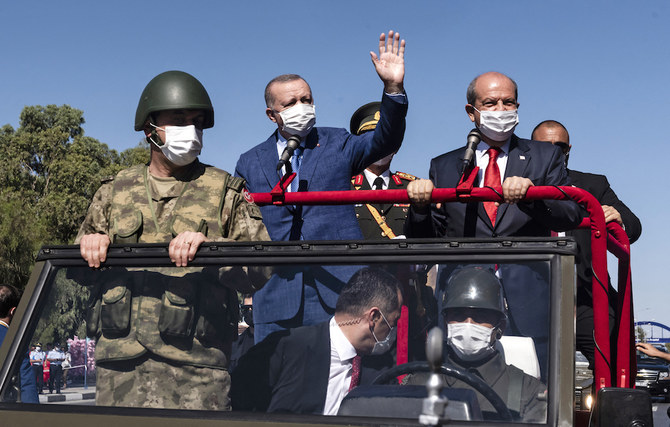ANKARA/DUBAI: Europe’s longest “frozen conflict” is once again in the spotlight following a visit to the northern part of Cyprus by Turkish President Recep Tayyip Erdogan, during which he repeated his demand for a two-state solution and backed moves to rebuild a ghost town that lies within the island’s military buffer zone.
Erdogan’s appearance at a military parade on July 20 in the northern part of the capital, Nicosia, might have passed off without further ado had he not reiterated his contentious position on the Cyprus dispute with remarks that were echoed and elaborated on by his ally, Turkish Cypriot leader Ersin Tatar.
If the past is any guide, the Cyprus imbroglio defies ready solution, be it reunification or partition.
Attempts to resolve the conflict suffered a blow in 2004 when Greek Cypriots voted against a UN proposal to reunite the Turkish and Greek sides of the nation, while Turkish Cypriots approved it. Three out of four Greek Cypriots rejected the plan put forward by Kofi Annan, the UN chief, that would have given tens of thousands of Cypriots the right to return to homes they lost in 1974.
The year 1974 was a watershed in the history of Cyprus: Turkish troops occupied the northern third of the country in response to an abortive coup engineered by a Greek military junta that aimed to unite the island with Greece.
As for the ghost town undergoing a controversial reopening with the blessing of Erdogan, it is Varosha, a suburb of Famagusta, once the Mediterranean island’s top coastal resort whose Greek Cypriot population fled with the Turkish invasion.
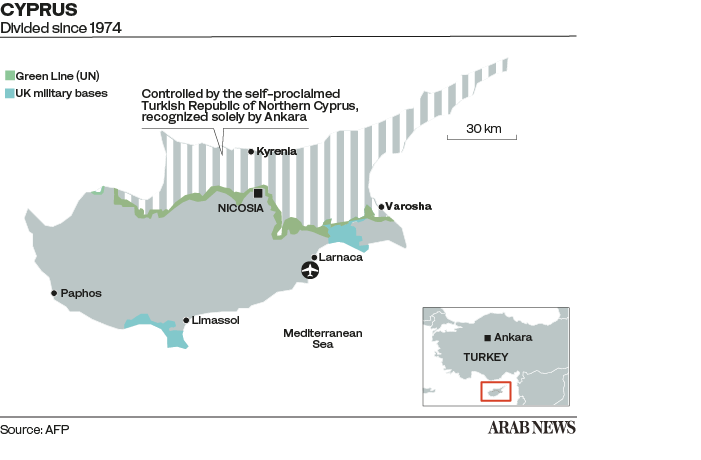
Budding hopes of a UN-sponsored settlement in the aftermath of the invasion had been nipped by the unilateral establishment in 1983 of the Turkish Republic of Northern Cyprus (TRNC), recognized only by Turkey. While Cyprus has been largely at peace since the de-facto partition of 1974, the “frozen conflict” has proved so intractable, it has come to be known as the “graveyard of diplomats.”
Now, in addition to playing the nationalist card to humor their domestic constituencies, Erdogan and the Turkish Cypriot leadership may well be signaling their loss of faith in time and negotiations to bring the breakaway north’s international isolation and decades-old economic embargo to an end.
For a start, they intend to convert part of Varosha into a resettlement site and to allow people to reclaim properties vacated during the 1974 invasion. In November 2020, Turkish Cypriot authorities reopened a small area of Varosha. Now Erdogan says “a new era will begin in Maras (the Turkish name for Varosha) which will benefit everyone.”
During his latest visit to the northern part of Nicosia, Erdogan, who as Turkey’s prime minister in 2004 had backed the Annan reunification plan, asserted that Ankara does not have “another 50 years to waste.”
On Wednesday, in a video address to members of his AK Party, he said: “We will make every possible effort to ensure recognition of the Turkish Cypriot state as soon as possible. All other offers and proposals are not valid anymore.”
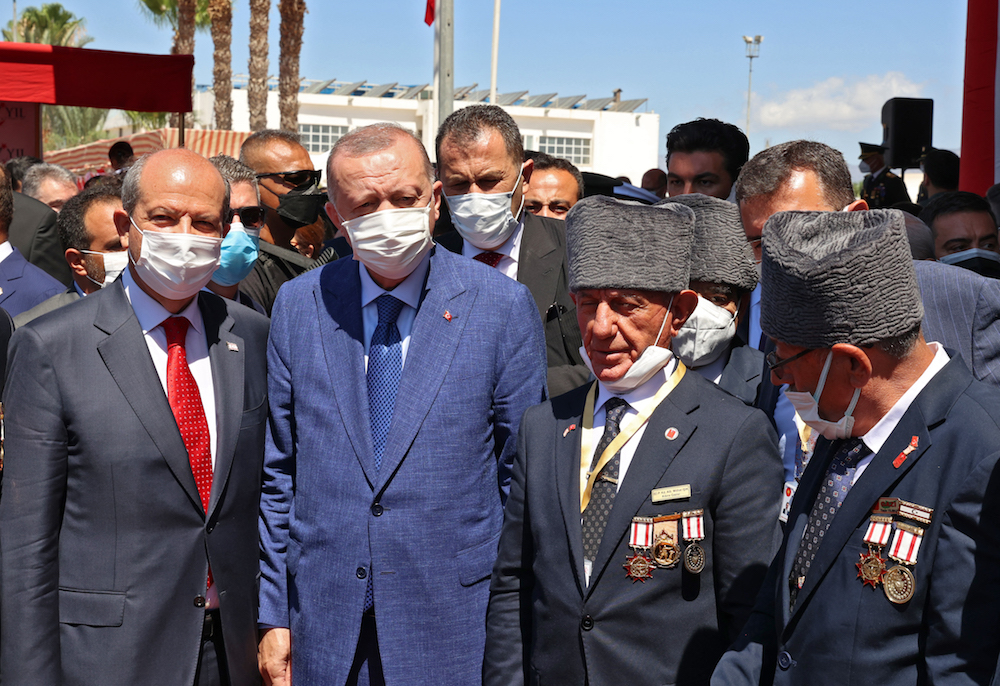
Erdogan vowed to make no "concession" as he pressed for a two-state solution for Cyprus, during a visit to the divided eastern Mediterranean island. (AFP)
Tatar got down to the nitty-gritty of the regeneration plans, saying that an initial 3.5 percent of Varosha, whose abandoned hotels, residences and shops lie under Turkish control, would be removed from its military status.
An earlier version of the buffer zone where Varosha is situated was created in 1964 by a UN peacekeeping force in response to a spate of inter-communal violence. Following the 1974 Turkish invasion, this so-called Green Line became the de-facto line of partition.
While an estimated 165,000 Greek Cypriots fled south, about 45,000 Turkish Cypriots relocated to the north, where they established their own independent administration. Despite a unanimous UN Security Council resolution, Turkey refused to withdraw its troops from Cyprus.
According to the UN resolutions, Varosha should be handed over to UN administration and the town’s vacant properties should be returned to their legal owners. In a statement on Friday, the Security Council condemned “the further reopening of a part of the fenced-off area of Varosha” and expressed “deep regret regarding these unilateral actions.”
THENUMBER
* 1,281,506 - Current total population of Cyprus.
Some analysts think Erdogan’s rhetoric is designed to encourage Greek Cypriots to deal with the Turkish side on an equal footing.
Ahmet Sozen, professor of political science and international relations at Eastern Mediterranean University in Northern Cyprus, says the pressure tactics might push Greek Cypriots to enter into negotiations, albeit gradually.
“This is a game-changing move. It is just a beginning, because Greek Cypriots do not welcome it,” he told Arab News, “But, at the end of the day, there are 300 individual claims by Greek Cypriots to their properties in this area and it should encourage the Greek side to negotiate with the Turkish side over these property rights.”
Sozen believes Turkey intends to use the Varosha issue to launch future rounds of negotiation with a stronger hand with the goal of achieving a two-state solution.
“This move also aims to prevent thousands of applications to the European Court of Human Rights (ECHR) in Strasbourg by those who claim their property rights in Varosha. By opening a part of the military zone to civilian use, it will give Turkish Cyprus’ Immovable Property Commission (IPC) the authority to deal with the compensation issue,” he said.
The IPC is the only Turkish Cypriot institution recognized by the ECHR, which dropped several applications lodged by displaced Greek Cypriots after it was established for redressal of such grievances. If Varosha is partially returned to civilian use, the IPC will likely be in charge of resolving property issues.
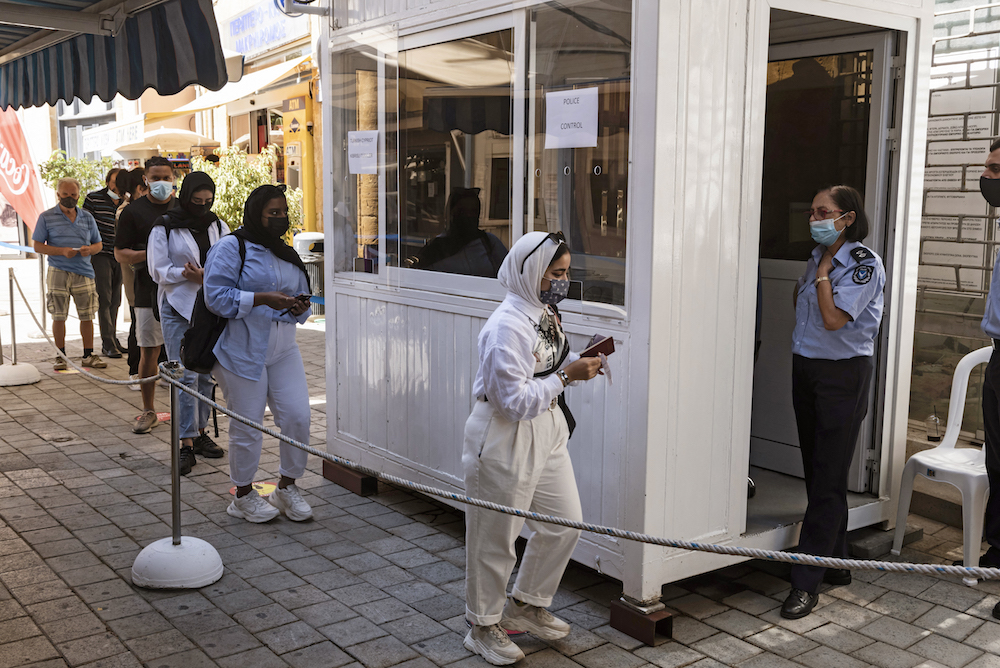
People cross the Ledras crossing point in the Cypriot capital Nicosia from the southern part towards the self-proclaimed Turkish Republic of North Cyprus (TRNC), on June 4, 2021, as the country opens its crossing points following the easing of restriction in the divided island amid the COVID-19 pandemic. (AFP)
But as the Security Council condemnation demonstrates, Turkey is facing strong pushback from NATO allies, EU members and even the UN. Antony Blinken, the US Secretary of State, who discussed the developments with his Greek Cypriot counterpart, Nikos Christodoulides, has called the Varosha move “unacceptable and inconsistent” with UN resolutions.
A spokesman for UN Secretary-General Antonio Guterres said he was “deeply concerned” and appealed to “all parties to refrain from unilateral actions that provoke tensions.”
Nicos Anastasiades, the president of Cyprus, described any moves to open up Varosha as “illegal and unacceptable.” If Turkey’s real concern was returning properties to their legal owners, “they should have adopted UN resolutions and handed the city over to the UN, allowing them to return in conditions of safety,” he said.
Dimitris Tsarouhas, an expert at Bilkent University, in Ankara, describes the new approach to the Varosha issue as “strange although not unexpected,” since it is “not really a Turkish Cypriot decision but a Turkish one.”
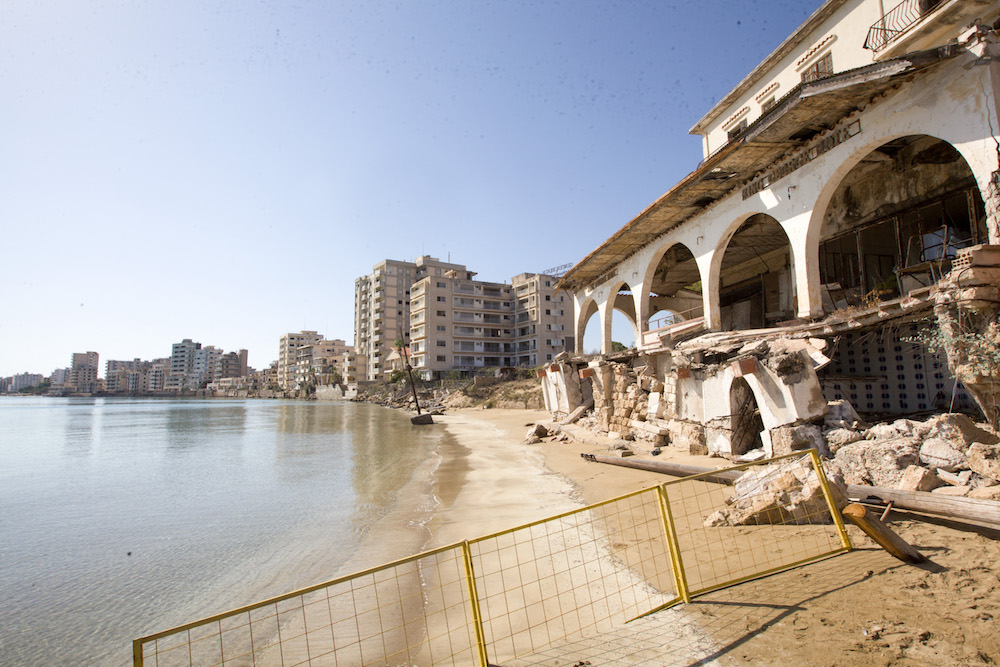
Derelict hotels, restaurants, and residential buildings remain abandoned at the fenced-off beachfront eastern town of Varosha, in the Turkish-held north of the divided Mediterranean island of Cyprus, on October 14, 2020. (AFP/File Photo)
“The enclave had been abandoned by its Greek Cypriot owners in 1974 and they have lived in hope of returning ever since, not least because Turkey did not send in settlers,” he told Arab News.
“I am guessing that this small reopening aims at enticing Greek Cypriots to move back in, or at least to claim their property through the Turkish Cypriot authorities, thus partially legitimizing the TRNC.”
Noting that the EU and the US “both have been explicit in condemning a move contradicting decades of UN work on Cyprus,” Tsarouhas said: “It seems to me that Erdogan’s goal is to consolidate the nationalist coalition at home and show to the world that he really means the two-state policy he proposed for the first time a few years back.”
Once famous as a playground of Hollywood celebrities, Varosha may yet rise from the ruins of war. But for now, its new lease of life is mainly as a bargaining chip in a geopolitical game.


